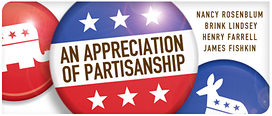Nancy’s response is a model of judicious, careful, and thoughtful argument. I don’t find much in it to disagree with. Which raises the question: why are our overall evaluations of partisanship so different? We both see a mix of good and bad in both partisanship and antipartisanship, so why does she end up siding with the former while I throw in with the latter?
First, I think, is a matter of differences in focus. Nancy is taking the wide view of a political theorist, looking at political parties as a general phenomenon and pointing out the underappreciated good things they do to make democratic politics work as well as it does. I, on the other hand, am looking at partisanship as a think tank wonk engaged in the contemporary American debate about public policy. From where I stand, it is quite clear that partisanship is an enduring frustration. I regularly see brilliant intellectuals and highly knowledgeable experts on both sides of the aisle whose contributions to our understanding of how the world works are compromised by tribal partisan loyalties and emotional commitments to semi-coherent ideological narratives. And I can’t help but think that’s a terrible shame. I understand that politicians have to be political, and that’s fine. But why do outsiders — academics, journalists, think tank scholars — who do not hold or seek political power have to be politicized? I can’t imagine that Nancy would deny the very sharp conflict between the ethic of partisanship and the ethic of intellectual integrity. To Nancy, though, it’s just a small piece of the larger puzzle she is examining. For me, though, that piece is where I work.
Another difference, I suspect, is a difference in overall attitude toward politics. A clue about this possible difference crops up when Nancy, in discussing partisan zeal, counters that “we should not allow this concern to trump our concern for the more widespread, enduring, and dangerous phenomenon of apathy and disengagement.” I have to say, apathy and disengagement don’t worry me much at all. I think democratic politics is by its nature a dirty business — necessary to be sure, but squalid all the same. To my way of thinking, romanticizing the often stomach-turning reality of mass representative democracy is far more dangerous than apathy and disdain. Yes, parties serve a useful social function. So do loan sharks and prostitutes. It doesn’t follow, though, that I should think highly of the individuals who fulfill these functions.
Finally (for now, at least), Nancy makes the excellent point that partisanship has virtues at the collective, systemic level that may not be apparent when examining individual partisans. I wonder if she has failed to extend the same broadened view to antipartisanship. So generally attentive to pluralism, she nonetheless seems to want to wish antipartisanship out of existence. Is there really no place for us non-belongers in this incredibly diverse society? Is there no positive function we serve? I agree with Nancy that, over the long run (and in healthy, stable democracies), the desire to win elections serves as a constraint on partisanship’s worst vices. But might not the strain of disdain for politics and politicians that runs through American culture — and that is fed by people like me — serve as an additional constraint? When you know that a good chunk of people think what both you and your opponents are doing is contemptible, surely that puts some damper on your Manichean pretensions.

